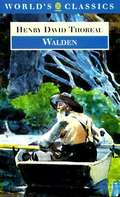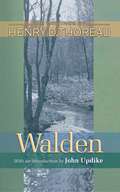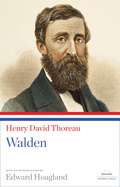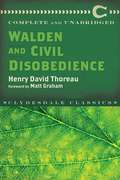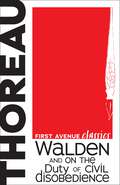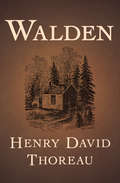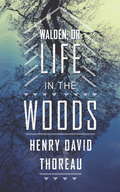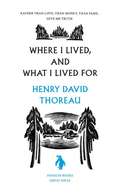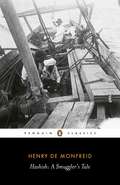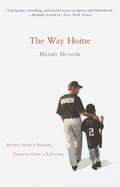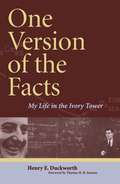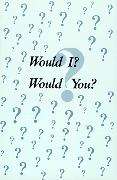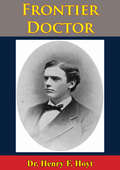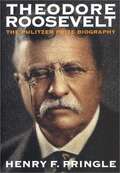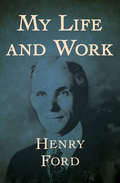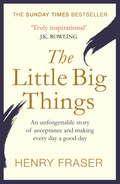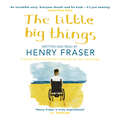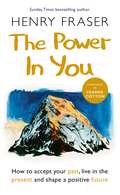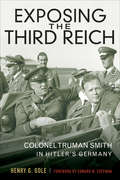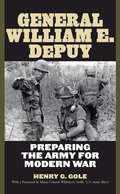- Table View
- List View
Walden
by Henry David Thoreau Stephen FenderIn 1845 Henry David Thoreau began a new life, spending most of each week for over two years in a rough hut he built himself on the northwest shore of Walden Pond, just a mile and a half from his home town of Concord, Massachusetts. Walden is Thoreau's autobiographical account of this experiment in solitary living, his refusal to play by the rules of hard work and the accumulation of wealth and, above all, the freedom it gave him to adapt his living to the natural world around him. This new edition traces the sources of Thoreau's reading and thinking and considers the author in the context of his birthplace and his sense of its history - social, economic, and natural. In addition, an ecological appendix provides modern identifications of the myriad plants and animals to which Thoreau gave increasingly close attention as he became acclimatized to his life at Walden. Long-revered by political reformers and environmentalists, Walden is here reassessed by Stephen Fender, whose edition is based on research into the material conditions of Thoreau's life in Concord, and the town's place in the history of mid-nineteenth-century New England. [This text is listed as an example that meets Common Core Standards in English language arts in grades 11-12 at http://www.corestandards.org.]
Walden
by Henry David Thoreau<P>To celebrate the 150th anniversary of the original publication of Thoreau's classic work (which is cited in Books for College Libraries, 3rd ed.), this special edition is published in cooperation with the Walden Woods Project, a nonprofit organization founded in 1990 to preserve the land, literature, and legacy of Thoreau. The text includes a brief introduction by E. O. Wilson. <P>[This text is listed as an example that meets Common Core Standards in English language arts in grades 11-12 at http://www.corestandards.org.]
Walden
by Henry David ThoreauIn 1845 Henry David Thoreau left his pencil-manufacturing business and began building a cabin on the shore of Walden Pond near Concord, Massachusetts. This lyrical yet practical-minded book is at once a record of the 26 months Thoreau spent in withdrawal from society -- an account of the daily minutiae of building, planting, hunting, cooking, and, always, observing nature -- and a declaration of independence from the oppressive mores of the world he left behind. Elegant, witty, and quietly searching, Walden remains the most persuasive American argument for simplicity of life clarity of conscience. For the first time, the authoritative editions of works by major American novelists, poets, scholars, and essayists collected in the hardcover volumes of The Library of America are being published singly in a series of handsome paperback books. A distinguished writer has contributed an introduction for each volume, which also includes a chronology of the author's life and career, an essay on the text, and notes. From the Trade Paperback edition.
Walden and Civil Disobedience (First Avenue Classics Ser.)
by Henry David Thoreau Matt GrahamPackaged in handsome, affordable trade editions, Clydesdale Classics is a new series of essential works. From the musings of academics such as Thomas Paine in Common Sense to the striking personal narrative of Harriet Jacobs in Incidents in the Life of a Slave Girl, this new series is a comprehensive collection of our intellectual history through the words of the exceptional few.First published in 1854, Walden was written by the renowned transcendentalist Henry David Thoreau about his experience living off the land at Walden Pond for more than two years. Thoreau divides his deliberations and meditations into a variety of sections which include his views on economy and the natural world, the importance of reading and literature, the values of both solitude and companionship, and other personal reflections. In addition to Walden, this edition also includes Thoreau’s essay on Civil Disobedience, which discusses his views on the nature of government and its negative effects on society.With a new foreword by survivalist Matt Graham, venture into the woods with Thoreau and explore the complexities of life and truth in this classic piece of American literature.
Walden, and On the Duty of Civil Disobedience (First Avenue Classics ™)
by Henry David ThoreauIn these two American literary classics, Henry David Thoreau offers readers his experiences and thoughts on how to live a more fulfilling life and stand up for what is right. Having spent two years living in solitude at Walden Pond, he stresses the importance of a quiet, reflective life and the rewards of a nonmaterialistic existence in Walden. His essay "On the Duty of Civil Disobedience" discusses his belief in nonviolent protests against an unjust government—in particular, he attacks the US government's approval of slavery and support for the Mexican-American War. These unabridged versions were first published in 1854 and 1849, respectively, but their ideas are timeless.
Walden: Large Print
by Henry David Thoreau<P>An American masterwork in praise of nature, self-reliance, and the simple lifeI went to the woods because I wished to live deliberately, to front only the essential facts of life, and see if I could not learn what it had to teach, and not, when I came to die, discover that I had not lived. <P>In 1845, the transcendentalist Henry David Thoreau moved from his home in the town of Concord, Massachusetts, to a small cabin he built by hand on the shores of Walden Pond. <P>He spent the next two years alone in the woods, learning to live self-sufficiently and to take his creative and moral inspiration from nature. P <P>art memoir, part philosophical treatise, part environmental manifesto, Walden is Thoreau's inspirational account of those extraordinary years and one of the most influential books ever written.
Walden; Or Life in the Woods
by Henry David ThoreauA multi-faceted classic of American literature and philosophy. At the beginning of the book, Thoreau leaves his civilized life behind, planning to live in the wilderness for two years to discover what a simpler, purer life has to offer him. He builds a home for himself near Walden pond, and begins on a journey of discovery. Throughout the course of the book Thoreau mixes in-depth explanations of how he lived with reflective musings on what his life of tranquility, simplicity, and closeness with nature taught him. Penguin Random House Canada is proud to bring you classic works of literature in e-book form, with the highest quality production values. Find more today and rediscover books you never knew you loved.
Where I Lived, and What I Lived For (Penguin Books - Great Ideas)
by Henry David ThoreauThoreau's account of his solitary and self-sufficient home in the New England woods remains an inspiration to the environmental movement--a call to his fellow men to abandon their striving, materialistic existences of 'quiet desperation' for a simple life within their means, finding spiritual truth through awareness of the sheer beauty of their surroundings.
Hashish
by Henry De MonfreidNobleman, writer, adventurer and inspiration for the swashbuckling gun runner in the Adventures of Tintin, Henri de Monfried lived by his own account ‘a rich, restless, magnificent life’ as one of the great travellers of his or any age. Infamous as well as famous, his name is inextricably linked to the Red Sea and the raffish ports between Suez and Aden in the early years of the twentieth century. This is a compelling account of how de Monfried seeks his fortune by becoming a collector and merchant of the fabled Gulf pearls, then is drawn into the shadowy world of arms trading, slavery, smuggling and drugs. Hashish was the drug of choice, and de Monfried writes of sailing to Suez with illegal cargos, dodging blockades and pirates.
The Way Home: Scenes from a Season, Lessons from a Lifetime
by Henry Dunow: When Henry Dunow signs up to coach his son Max's Little League team on Manhattan's Upper West Side, he finds himself looking back on his own childhood and his father, Moishe, a Yiddish writer and refugee from Hitler's Europe, who had considered recreation like playing catch with his son narishkeit, "foolishness." Determined to be a different kind of parent to his first grader, Dunow bumbles through a self-test of fatherhood on the scruffy fields of New York's Riverside Park, playing coach, cheerleader, father, and friend to a ragtag bunch of seven-year-olds, many of whom are discovering baseball for the first time. The Way Home is the affecting and ironic story of Dunow's journey of discovery as he watches his relationship with Max evolve over the course of a Little League season, and comes to understand what being a father to his son can teach him about the man who was his own father.
One Version of the Facts: My Life in the Ivory Tower
by Henry E. DuckworthIn his engaging memoirs, One Version of the Facts: My Life in the Ivory Tower, Dr. Henry Duckworth takes readers from his student days in Winnipeg and Chicago in the 1930s to his time as president of the University of Winnipeg (1971-1981) and chancellor of the University of Manitoba. An accomplished physicist, he wrote the first definitive text in English on mass spectroscopy, discovered the last stable isotope (platinum), and helped create important programs at universities and at the National Research Council. He also served on numerous councils for scientific and university organizations, and rubbed shoulders with Nobel Prize winners at international conferences.With humour and modesty, Henry Duckworth recalls trends, changes, and crises he witnessed throughout his long university career. He offers his observations, his opinions, his "version of the facts," providing a special insight into critical years in Canada's university education history, as well as his own specialty, atomic research.
Would I? Would You?
by Henry EinspruchPresents seventeen biographical sketches of seventeen people from a variety of Jewish traditions who accepted Jesus Christ as Messiah.
Twenty Years on the Pacific Slope: Letters of Henry Eno from California and Nevada, 1848-1871
by Turrentine Jackson Henry EnoThe Henry Eno letters from California and Nevada have been described as "one of the most interesting group of letters to have appeared in some years."* Twenty years of travel took Eno to out-of-the-way places on the Pacific Slope about which there is a dearth of information. His story is not merely another account or diary of the gold-rush era; it is even more closely related to the events on the West Coast after this period of high excitement was past. Eno's initial years were spent at Mokelumne Hill, a thriving mining camp, where professional men and politicians who were later to gain great prominence and success in the state of California were among his friends and associates. Here Henry Eno, like many men who came to the West in search of gold, became a small-time entrepreneur, was victimized by forces largely beyond his control, was wiped out financially, and forced to turn to other means of making a living.
A Frontier Doctor
by Henry F. HoytThis is the autobiography of the famous Henry F. Hoyt, a medical doctor and notable adventurer of the American West. His career started as a physician in the Goldrush town Deadwood, before moving west into the Texas Panhandle. He was by turns a Doctor, a Vigilante and a Cowboy, and he recounts stories of Charlie Siringo, John Chisum, Cole Younger, Billy The Kid, Jesse James, and many other figures of the Wild West. During the Spanish-American War he served as Chief Surgeon, was wounded and decorated in the Philippines, his life was one adventure after another. Illustrated with photographs.
Theodore Roosevelt
by Henry F. PringleThis is a carefully revised and--perhaps happily--shortened version of a biography first published almost a quarter of a century ago. The author said then, and reiterates now, that Theodore Roosevelt was polygonal. He was a man of many ideas, and few of them lacked brilliance. The book still attempts to tell the whole story of an extraordinarily full life. <P><P> Pulitzer Prize Winner
My Life and Work: Henry Ford's Autobiography, With A History Of The Ford Motor Company (hardcover)
by Henry FordHenry Ford's classic treatise on life and business Written by the legendary inventor and industrialist who pioneered the American automotive industry, My Life and Work is a unique combination of memoir and business treatise. In straightforward and inviting prose, Henry Ford describes his early life as a mechanically inclined farmer's son, the inner workings of his famed motor company, and the development of the Model T. He provides analysis and commentary on some of his key business decisions, including his resolution to compensate workers well beyond the prevailing wage and his commitment to building a diverse workforce composed of "about the same proportions as a cross-section of a society in general." My Life and Work is an enduring American classic that captures the musings and philosophical considerations of one of the country's greatest visionaries. This ebook has been professionally proofread to ensure accuracy and readability on all devices.
The Little Big Things: The Inspirational Memoir of the Year
by Henry FraserTHE SUNDAY TIMES BESTSELLER"Henry Fraser is one of the most remarkable people I've ever met" J.K. Rowling"What a story of transformation, inner power and inspiration" Jonny Wilkinson The memoir of the year by Henry Fraser, motivational speaker and mouth artist with a foreword by J.K. Rowling.Being challenged in life is inevitable, but being defeated is optional...Henry Fraser was 17 years old when a tragic accident severely crushed his spinal cord. Paralysed from the shoulders down, he has conquered unimaginable difficulty to embrace life and a new way of living. Through challenging adversity, he has found the opportunity to grow and inspire others.This book combines his wisdom and insight into finding the gifts in life's challenges, and will resonate with anyone facing an obstacle, no matter how big or small. It includes Henry's thoughts on how to look at the right things and avoid the wrong, finding progress in whatever you do, and acknowledging and accepting the darkness when it comes. Right at the heart of Henry's inspiring philosophy is his belief that every day is a good day.
The Little Big Things: The Inspirational Memoir of the Year
by Henry FraserTHE SUNDAY TIMES BESTSELLER"Henry Fraser is one of the most remarkable people I've ever met" J.K. Rowling"What a story of transformation, inner power and inspiration" Jonny Wilkinson The memoir of the year by Henry Fraser, motivational speaker and mouth artist with a foreword by J.K. Rowling.Being challenged in life is inevitable, but being defeated is optional...Henry Fraser was 17 years old when a tragic accident severely crushed his spinal cord. Paralysed from the shoulders down, he has conquered unimaginable difficulty to embrace life and a new way of living. Through challenging adversity, he has found the opportunity to grow and inspire others.This book combines his wisdom and insight into finding the gifts in life's challenges, and will resonate with anyone facing an obstacle, no matter how big or small. It includes Henry's thoughts on how to look at the right things and avoid the wrong, finding progress in whatever you do, and acknowledging and accepting the darkness when it comes. Right at the heart of Henry's inspiring philosophy is his belief that every day is a good day.
The Little Big Things: The Inspirational Memoir of the Year
by Henry FraserA short, inspirational read from Henry Fraser, a young quadriplegic motivational speaker and artist.Henry Fraser was a 17-year old sports enthusiast and senior prefect when he broke his spinal cord and was left paralysed from the shoulders down. Life as he knew it was over and yet, through extraordinary determination and a positive attitude, he has forged a successful career as an inspirational speaker and an artist. He chose survival over defeat, and transformed unimaginable difficulty into an opportunity to grow and inspire others. This book will combine his wisdom and insight into accepting life's challenges with positivity and hope, and will resonate with anyone facing an obstacle, no matter how big or small. It includes Henry's thoughts on how to look at the right things and avoid the wrong things, looking for progress in whatever you do, and acknowledging and accepting the darkness when it comes. Right at the heart of Henry's inspiring philosophy is his belief that every day is a good day.Written and Read by Henry Fraser(p) 2017 Orion Publishing Group
The Power in You: How to Accept your Past, Live in the Present and Shape a Positive Future
by Henry FraserFrom Sunday Times bestselling author...'Henry Fraser is one of the most remarkable people I've ever met' J.K. Rowling'What a story of transformation, inner power and inspiration' Jonny Wilkinson Mouth artist, motivational speaker and author of the inspirational memoir The Little Big Things, Henry Fraser, explores the transformative power of acceptance in this motivational guide.If The Little Big Things was about Henry's past, The Power in You is about his present and his future. And through understanding his daily experience, Henry teaches us all how best we can live. This book is about right now, and it's about tomorrow.It's about recognising progress, it's about accepting our past to become free of it, it's about living in the now to avoid anxiety. It's future focused on the positive.Henry discusses acceptance, how to adapt and deal with our pasts, how to forgive ourselves, and how to forgive others. He will remind us to live in the present and just how empowering that can be, how to work through self-doubt, how to become aware of our progress, and how everything you need in life comes from within you.The power is in you.
The Power in You: How to Accept your Past, Live in the Present and Shape a Positive Future
by Henry FraserFrom Sunday Times bestselling author...'Henry Fraser is one of the most remarkable people I've ever met' J.K. Rowling'What a story of transformation, inner power and inspiration' Jonny Wilkinson Mouth artist, motivational speaker and author of the inspirational memoir The Little Big Things, Henry Fraser, explores the transformative power of acceptance in this motivational guide.If The Little Big Things was about Henry's past, The Power in You is about his present and his future. And through understanding his daily experience, Henry teaches us all how best we can live. This book is about right now, and it's about tomorrow.It's about recognising progress, it's about accepting our past to become free of it, it's about living in the now to avoid anxiety. It's future focused on the positive.Henry discusses acceptance, how to adapt and deal with our pasts, how to forgive ourselves, and how to forgive others. He will remind us to live in the present and just how empowering that can be, how to work through self-doubt, how to become aware of our progress, and how everything you need in life comes from within you.The power is in you.
The Lasting Loneliness of Nathaniel Hawthorne: A Study of the Sources of Alienation in Modern Man
by Henry G. FairbanksBiography emphasizing how environment and personality impact literature.
Exposing the Third Reich: Colonel Truman Smith in Hitler's Germany (American Warriors Series)
by Henry G. Gole&“A fascinating book about a virtually unknown officer who played a major role in the development of US military planning before and during World War II&” (Bowling Green Daily News). A vital source of American intelligence on Hitler&’s rise to power and military ambitions, Colonel Truman Smith was one of the most compelling and controversial figures of the Second World War. In Exposing the Third Reich, Henry G. Gole tells this soldier's story for the first time. An American aristocrat from a prominent New England family, Smith became an expert on Germany when he was first assigned there during the Allied occupation of 1919. As a military attaché in 1935, he arranged for his good friend Charles Lindbergh to inspect the Luftwaffe. The Germans were starstruck by the famous aviator, enabling Smith to gather key intelligence about their air capability. His deep access and knowledge made him invaluable to General George C. Marshall; however, the colonel's friendliness with Germany also aroused suspicion that he was a Nazi sympathizer. Gole demonstrates that, far from condoning Hitler, Smith was among the first to raise the alarm: he predicted many of the Nazis' moves years in advance and feared that the international community would not act quickly enough. Featuring many firsthand observations of the critical changes in Germany between the world wars, this biography presents an indispensable look both at a fascinating figure and at the nuances of the interwar years.
General William E. DePuy: Preparing the Army for Modern War (American Warriors Series)
by Henry G. GoleThis &“excellent biography&” of one of the US Army&’s unsung heroes &“provides a much-needed re-examination of the early post-Vietnam Army" (Bowling Green Daily News). By the 1970s, the United States Army was demoralized by the outcome of the Vietnam War and shifting attitudes at home. The institution as a whole needed to be reorganized and reinvigorated—and General William E. DePuy was the man for the job. In 1973, DePuy was appointed commander of the newly established Training and Doctrine Command (TRADOC). By integrating training, doctrine, combat developments, and management in the US Army, he cultivated a military force prepared to fight and win in modern war. General William E. DuPuy is the first full-length biography of this key figure in American military history. With extensive interviews with those who knew DePuy, as well as access to his personal papers, Henry G. Gole chronicles and analyzes his unique contributions to the Army and nation. Gole guides the reader from DePuy's boyhood and college days in South Dakota through the major events and achievements of his life. During World War II, DePuy served in the 357th Infantry Regiment in Europe from the Normandy invasion until 1945, when he was stationed in Czechoslovakia. DePuy was asked by George Patton to serve as his aide; he supervised clandestine operations in China; he was instrumental in establishing Special Forces in Vietnam; and he briefed President Lyndon B. Johnson in the White House. But his finest contribution was fixing a broken Army.

